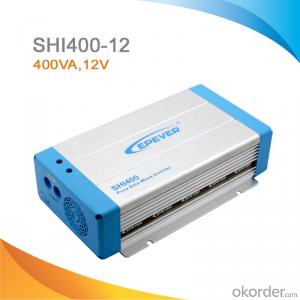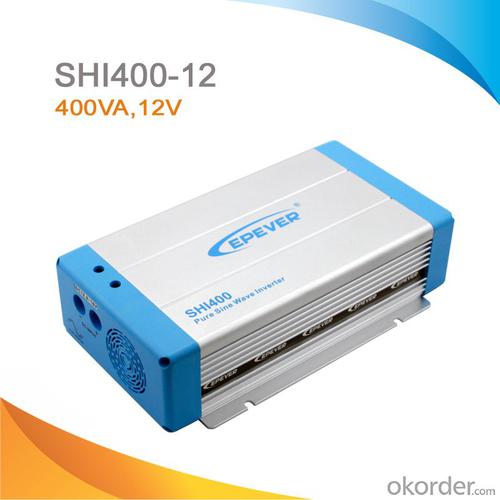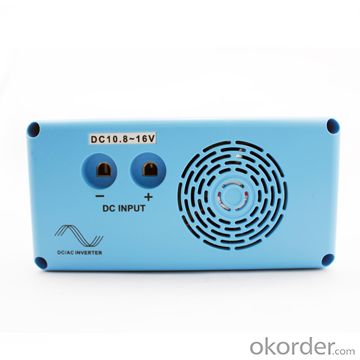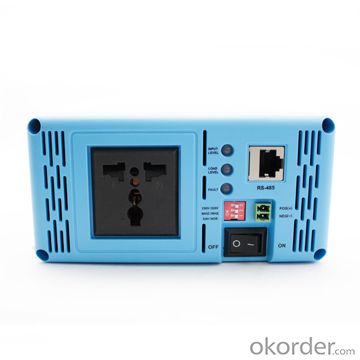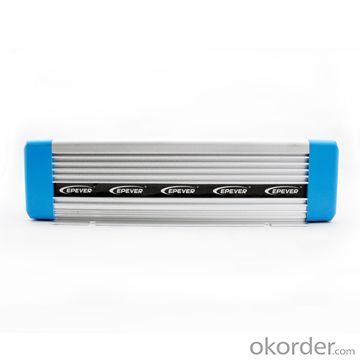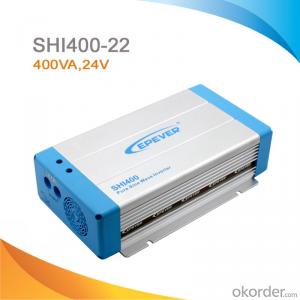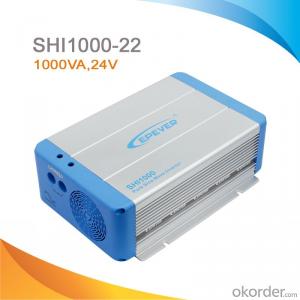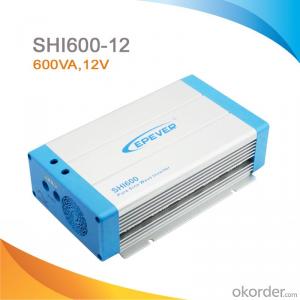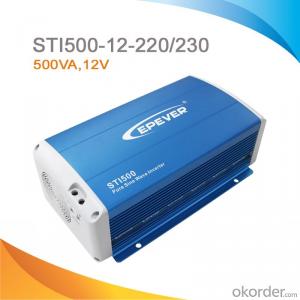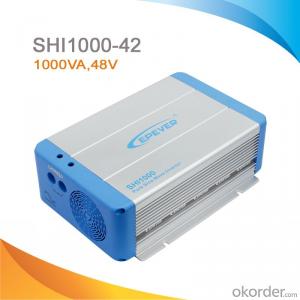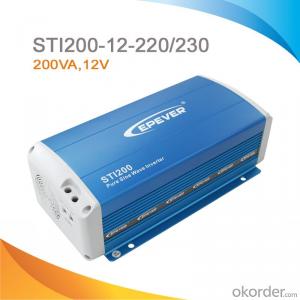Chinese Solar Inverter SHI 400W Pure Sine Wave Inverter/Power Inverter DC-AC, DC/AC Inverter, DC 12V to AC 220V/230V, SHI400-12
- Loading Port:
- China Main Port
- Payment Terms:
- TT or LC
- Min Order Qty:
- -
- Supply Capability:
- -
OKorder Service Pledge
OKorder Financial Service
You Might Also Like
Description
SHI series is a pure sine wave inverter which can convert 12/24/48Vdc to 220/230Vac 50/60Hz based on full digital and intelligent design. It features high reliability, high efficiency, concise outline, small volume, easy installation and operation. The inverter can be applied in many fields, such as household appliances, electric tools and industrial devices etc, especially for solar photovoltaic power system.
Features:
·Input & output fully isolation
·Adoption of advanced SPWM technology, pure sine wave output
·Dynamic current loop control technology to ensure inverter reliable operation
·Wide DC input voltage range
·The output voltage and frequency can be switched
·Low output harmonic distortion(THD≤3%)
·LED indicators for input voltage range, load power range, normal output & failure state
·Optional energy saving mode
·Wide working temperature range (industrial level)
·Continuous operation at full power
Protections:
·Output short circuit protection
·Overload protection
·Input low voltage protection
·Input over voltage protection
·Overheating protection
·Inverter abnormal protection
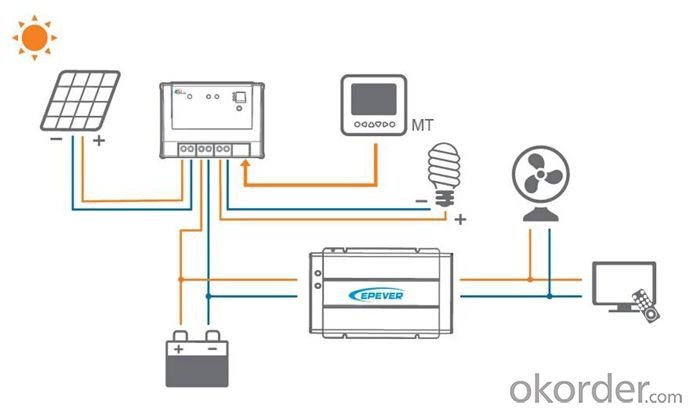
Specification:
Types | SHI400-12 | SHI400-22 |
Nominal Battery Voltage | 12V | 24V |
Input Voltage Range | 10.8~16Vdc | 21.6~32Vdc |
No Load Current | ≤0.8A | ≤0.45A |
Output Wave | Pure Sine Wave | |
Output Voltage | 220Vac±3% / 230Vac±10% | |
Continuous Power | 400W | |
Power 10 sec | 600W | |
Power 1.5 sec | 800W | |
Surge Power | 900W | |
Frequency | 50/60Hz±0.2% | |
Distortion THD | ≤ 3% (resistive load) | |
Efficiency at Rated Power | ≥91% | ≥92% |
Max. Efficiency | ≥92% | ≥93% |
Terminal | 16mm2 | |
Dimensions | 280×166×74.3mm | |
Installation | 150×158mm | |
Hole Size | Φ5mm | |
Net Weight | 1.8kg | |
Working Temperature | -20℃~ +50℃ | |
Storage Temperature | -35℃~ +70℃ | |
Humidity | < 95% (N.C.) | |
Altitude | < 5000m(Derating to operate according to IEC62040 at a height exceeding 1000m) | |
Insulation Resistance | Between DC input terminals and metal case: ≥550MΩ; Between AC output terminals and metal case: ≥550MΩ. | |
Dielectric Strength | Between DC input terminals and metal case: Test voltage AC1500V, 1 minute Between AC output terminals and metal case: Test voltage AC1500V, 1 minute | |
FAQ
Q1:Can we visit your factory?
A1:Sure,welcome at any time,seeing is believing.
Q2:Which payment terms can you accept?
A2:T/T,L/C,Moneygram,Paypal are available for us.
- Q: How does a solar inverter handle variations in battery charge levels?
- A solar inverter typically handles variations in battery charge levels by constantly monitoring the charge level of the battery. It adjusts the energy flow from the solar panels to the battery based on its charge level. When the battery charge is low, the inverter increases the energy flow from the solar panels to charge the battery. Conversely, when the battery charge is high, the inverter reduces the energy flow to prevent overcharging. This dynamic control ensures efficient use of the available solar energy and optimal charging of the battery.
- Q: How does the weight of a solar inverter affect its installation process?
- The weight of a solar inverter can significantly impact its installation process. Heavier inverters may require additional support structures or mounting equipment to ensure proper installation and stability. They may also require more manpower and specialized equipment during the installation process. Conversely, lighter inverters may be easier to handle and install, potentially reducing installation time and effort. Therefore, the weight of a solar inverter is an important consideration that can influence the overall installation process.
- Q: How does a solar inverter handle voltage fluctuations from the solar panels?
- A solar inverter handles voltage fluctuations from the solar panels by employing a technique called Maximum Power Point Tracking (MPPT). The MPPT algorithm continuously monitors the voltage and current output of the solar panels and adjusts the operating point to ensure maximum power transfer. This allows the inverter to adapt to varying sunlight intensity and temperature conditions, efficiently converting the DC power generated by the panels into standard AC power. The inverter also incorporates voltage regulation and protection mechanisms to ensure stable and safe operation despite any voltage fluctuations.
- Q: Can a solar inverter be used with multiple solar arrays?
- Yes, a solar inverter can be used with multiple solar arrays. In fact, many solar installations utilize multiple solar arrays to increase the overall power output. The solar inverter converts the DC power generated by the solar arrays into AC power that can be used in homes or fed back into the grid. It is designed to handle the combined power output from multiple solar arrays, allowing for efficient utilization of solar energy.
- Q: How do you connect a solar inverter to the electrical grid?
- To connect a solar inverter to the electrical grid, you typically follow a few steps. First, ensure that your solar panels are properly installed and generating electricity. Then, connect the DC output of the solar panels to the DC input of the inverter. Next, connect the AC output of the inverter to your home's electrical distribution panel or directly to the electrical grid through a utility meter. Finally, consult with a qualified electrician to ensure that the installation meets all relevant safety and electrical codes.
- Q: How does a solar inverter synchronize with the grid?
- A solar inverter synchronizes with the grid by constantly monitoring the grid's voltage and frequency. It adjusts its own output to match the grid's characteristics, ensuring that the electricity it generates is in phase with the grid's power supply. This synchronization process allows the solar inverter to seamlessly connect and feed electricity into the grid, maximizing the efficiency and reliability of the solar power system.
- Q: What is the role of MPPT (Maximum Power Point Tracking) in a solar inverter?
- The role of MPPT (Maximum Power Point Tracking) in a solar inverter is to optimize the efficiency and output of the solar panel system. MPPT technology enables the inverter to constantly track and adjust the operating point of the panels, ensuring that they are operating at their maximum power point, where the highest power output is achieved. This allows the system to capture the maximum amount of energy from the sun, maximizing the overall efficiency and performance of the solar inverter.
- Q: Can a solar inverter be used in remote areas without access to the grid?
- Yes, a solar inverter can be used in remote areas without access to the grid. Solar inverters are designed to convert the direct current (DC) electricity generated by solar panels into alternating current (AC) electricity that can be used to power electrical devices. In remote areas, solar inverters can be used to harness the energy from the sun and provide a reliable and sustainable source of electricity, without the need for a connection to the grid.
- Q: Can a solar inverter be used with a grid-tied system and a battery backup?
- Yes, a solar inverter can be used with a grid-tied system and a battery backup. The solar inverter is responsible for converting the direct current (DC) generated by the solar panels into alternating current (AC) that can be used to power appliances and feed back into the grid. In a grid-tied system with a battery backup, the solar inverter can also charge the batteries during the day when there is excess solar energy. This allows for the stored energy in the batteries to be used during power outages or when the grid is not available.
- Q: What are the potential risks of fire or explosions from a faulty solar inverter?
- The potential risks of fire or explosions from a faulty solar inverter include electrical malfunctions, overheating, short circuits, and insulation failures. These issues can lead to the accumulation of heat and energy, causing fires or explosions. Additionally, if the faulty inverter fails to properly regulate the flow of electricity, it can damage connected electrical devices or even cause electrocution hazards. Regular maintenance and inspections are crucial to minimize these risks and ensure safe operation of solar inverters.
Send your message to us
Chinese Solar Inverter SHI 400W Pure Sine Wave Inverter/Power Inverter DC-AC, DC/AC Inverter, DC 12V to AC 220V/230V, SHI400-12
- Loading Port:
- China Main Port
- Payment Terms:
- TT or LC
- Min Order Qty:
- -
- Supply Capability:
- -
OKorder Service Pledge
OKorder Financial Service
Similar products
Hot products
Hot Searches
Related keywords
